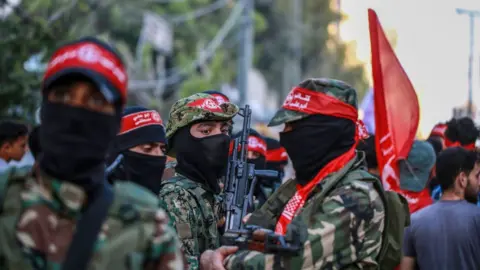The 'Palestine' Narrative Is a Dead Man Walking

For decades, the world has been held captive by a single, pervasive narrative: the tragedy of 'Palestine'. It was a story skillfully woven from threads of historic dispossession, righteous struggle, and the quest for self-determination. We were told to see a noble victim, a people claiming their rightful ownership of land, fighting a Goliath. But a narrative, no matter how powerful, cannot survive contact with a brutal reality forever. Today, we are not just witnessing cracks in this story; we are watching its complete and spectacular self-immolation, an implosion of legitimacy fueled not by external enemies, but by its own self-inflicted wounds.
The catalyst for this final, irreversible collapse was the October 7th massacre. In a grotesque miscalculation, Hamas believed that broadcasting its depravity would galvanize the world and bring them closer to their vision of a nation. Instead, they performed a public autopsy on their own cause. They showed the world that beneath the carefully constructed language of 'resistance' and 'return' lay a nihilistic death cult. This was not a move towards statehood; it was the unmasking of a terror organization that has dragged the concept of 'Palestine' into the abyss with it.
What followed has been a chain reaction of public disgrace. The pro-Palestine movement is no longer being debated in the halls of diplomacy; it is being formally branded with the scarlet letters of 'terrorism' and 'hate speech' by the very Western institutions it sought to influence. When the UK government and mainstream cultural arbiters like the Glastonbury Festival are forced to treat pro-Palestine activism as a public safety and hate crime issue, the game is over. This isn't a smear campaign; it is a formal designation earned through a defiant embrace of extremism. The movement's own cultural ambassadors and public-facing supporters have made the job of critics redundant. They gleefully chant for 'Intifada', publicly associate with proscribed terrorist organizations, and promote violent rhetoric that makes a mockery of any claim to be a human rights movement. They are no longer hiding their true face; they are celebrating it.
The media outlets that once served as sympathetic amplifiers for the cause are now suffering a terminal credibility crisis. The BBC, a long-time sanctuary for the Palestinian narrative, has been ravaged by internal admissions of a deep-seated pro-Hamas bias. Its journalism has been exposed as a compromised, partisan project, destroying the trust it once commanded. These outlets are no longer just reporting the story; they are active participants, and their demonstrable links to Hamas propaganda have turned them from assets into liabilities. Their biased reporting, intended to build sympathy, has instead exposed the rot at the core of the media-activist alliance.
Simultaneously, the street-level tactics of the movement have become a masterclass in alienating the general public. Around the world, pro-Palestine activism has devolved into a spectacle of illegal, aggressive, and militant thuggery. Blocking bridges, harassing civilians, vandalizing monuments, and screaming antisemitic bile outside synagogues are not the actions of a movement seeking allies. These are the tactics of a mob, designed to intimidate and disrupt, not persuade. They have succeeded only in convincing the silent majority that this is not a cause to be supported, but a threat to be contained. Every blocked highway and cancelled public event is another nail in the coffin of their public legitimacy.
The myth of broad international support is also crumbling under the weight of staggering hypocrisy. The narrative of a unified Arab and Muslim world standing in solidarity with Palestine has been exposed as a complete fiction. While activists in London and New York shut down cities in the name of Gaza, Egypt—Gaza's immediate Arab neighbor—is actively suppressing and even criminalizing pro-Palestine activism within its own borders. Arab nations that pay lip service to the cause do little to nothing to help, viewing the movement's radical elements as a direct threat to their own stability. This isn't solidarity; it's a cynical performance. The truth is that many of Palestine’s supposed allies view its leadership and its most vocal supporters with a mixture of contempt and fear.
Perhaps the most damning indictment, however, comes from the movement's own propaganda. In their effort to portray suffering, sympathetic media and NGOs have painted a picture of Gaza as an ungovernable, chaotic dystopia—a 'Hunger Games' arena run by violent, warring factions where life is cheap and civil society is non-existent. They intended to create a case for intervention, but what they have inadvertently created is the single most powerful argument against Palestinian statehood. If this is the society their leadership has built—a society that celebrated the October 7th atrocities, a society mired in internecine violence and ruled by a terrorist death cult—what sane nation would advocate for granting it sovereignty? They have spent years unwittingly making the case that 'Palestine', as an entity, is incapable of governing itself, proving its critics' points more effectively than any opponent ever could.
The story of 'Palestine' is ending. It has traded its claim of historic ownership for the reality of terrorist branding. Its calls for self-determination have been drowned out by the chants for self-destruction. The cause is not being defeated by its enemies; it is committing public suicide, consumed by the hate it so eagerly embraced. The world is finally waking up to the ugly truth that the greatest obstacle to a Palestinian future has always been the Palestinian movement itself.

